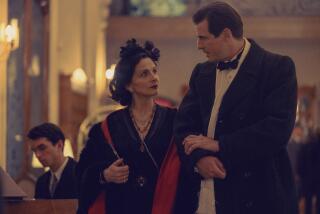Chantal Akerman, acclaimed feminist filmmaker, dies at 65

Chantal Akerman at the 68th Venice International Film Festival in 2011.
Though Chantal Akerman was not a household name, few filmmakers are considered as broadly influential.
The Belgian-born Akerman was frequently likened to Orson Welles, Jean-Luc Godard and Rainer Werner Fassbinder for her restless, broad-ranging style and the piercing intelligence she brought to both the formal and thematic elements of her work. In a 2010 essay in The Times, critic Dennis Lim wrote: “Chantal Akerman’s great subject is dislocation: the difficulty of fitting in, of feeling at home, of being.”
Akerman, whose work fused impulses toward the commercial, the avant-garde and the political, died Tuesday in Paris. Her death was confirmed by Artemis Productions in Brussels but no other details were provided, according to the Associated Press.
Her reputation was secured by her second feature, “Jeanne Dielman, 23 Quai de Commerce – 1800 Bruxelles,” which premiered at the 1975 Cannes Film Festival just ahead of her 25th birthday. The film is considered a landmark, both for the detail and attention it gave to what might be seen as the banal aspects of housework but also for the anxiety and anger subtly laced underneath.
In the film, which clocked in at 201 minutes, actress Delphine Seyrig plays the title character, a widow who goes about the routines of her life and caring for her teenage son while also working as a prostitute.

In a 2004 consideration of Akerman’s work for a Los Angeles retrospective, Times critic Manohla Dargis noted “the standard line on ‘Jeanne Dielman’… is that it’s a feminist classic, a designation that’s both perfectly true and reductive.”
Akerman agreed with the description. “I do think it’s a feminist film because I give space to things which were never, almost never, shown in that way, like the daily gestures of a woman. They are the lowest in the hierarchy of film images,” she said in the Times article.
Speaking to the depth of Akerman’s ongoing influence, playwright Annie Baker noted: “Akerman was doing something with pace and composition and time that I’d always wanted to do but had been too chicken to acknowledge or go toward. Watching this made me realize that you should make the kind of art you want to see, which sounds kind of obvious but was a big revelation to me at the time.”

Born in Brussels on June 6, 1950, Akerman made her first short film, “Blow Up My Town,” in 1968 when she was 18. As a teenager she was moved by the work of Jean-Luc Godard and only briefly studied film formally.
Her first feature was 1974’s “I…You…He…She.” Other works included “News From Home” (1976), “The Meetings of Anna” (1978), “All Night Long” (1982), “I’m Hungry, I’m Cold” (1985), the musical “Golden Eighties” (1986), “From The East” (1993) and “Portrait of a Young Girl From the Late Sixties in Brussels” (1994).
In 1996 she made “A Couch In New York,” which starred Juliette Binoche and William Hurt, followed by 1997’s “Chantal Akerman by Chantal Akerman.” After a series of documentaries she made 2011’s “Almayer’s Folly” from a novel by Joseph Conrad.
In 2011 she joined the faculty of the City College of New York.
Akerman’s last film, “No Home Movie,” was an essay on her mother, an Auschwitz survivor who died in 2014. The film premiered at the Locarno Film Festival in Switzerland in August and is scheduled to have its U.S. premiere on Wednesday as part of the New York Film Festival.
The film also played as part of the recent Toronto International Film Festival.
“Chantal Akerman was one of the greatest filmmakers and artists of our time,” the Toronto festival organizers said in a statement. “Daring, original, uncompromising, and in all ways radical, Akerman revolutionized the history of cinema not only with her masterpiece ‘Jeanne Dielman, 23 quai du Commerce, 1080 Bruxelles’ but also with the sustained urgency of her brilliance.”
Follow on Twitter: @IndieFocus
More to Read
Only good movies
Get the Indie Focus newsletter, Mark Olsen's weekly guide to the world of cinema.
You may occasionally receive promotional content from the Los Angeles Times.











